The Intel Core i3-7350K (60W) Review: Almost a Core i7-2600K
by Ian Cutress on February 3, 2017 8:00 AM ESTProfessional Performance: Windows
Agisoft Photoscan – 2D to 3D Image Manipulation: link
Agisoft Photoscan creates 3D models from 2D images, a process which is very computationally expensive. The algorithm is split into four distinct phases, and different phases of the model reconstruction require either fast memory, fast IPC, more cores, or even OpenCL compute devices to hand. Agisoft supplied us with a special version of the software to script the process, where we take 50 images of a stately home and convert it into a medium quality model. This benchmark typically takes around 15-20 minutes on a high-end PC on the CPU alone, with GPUs reducing the time.
Here we report the overall time to complete the test – sub-test results can be found in Bench.
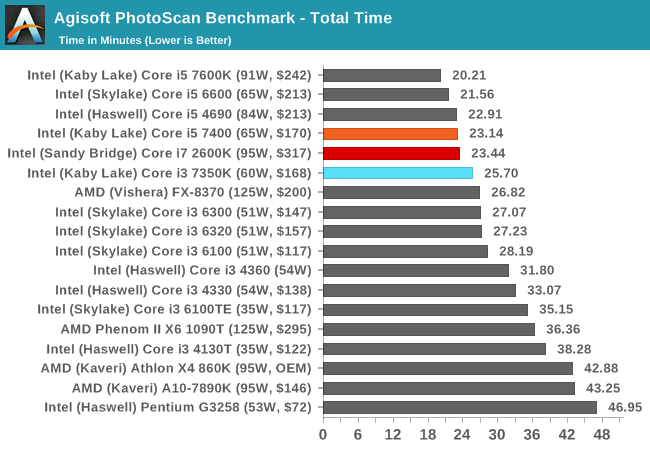
Photoscan is a mix of single and multi-threaded segments, but overall the extra cores in the i5/i7 beat the Core i3, but not by much.
Cinebench R15
Cinebench is a benchmark based around Cinema 4D, and is fairly well known among enthusiasts for stressing the CPU for a provided workload. Results are given as a score, where higher is better.
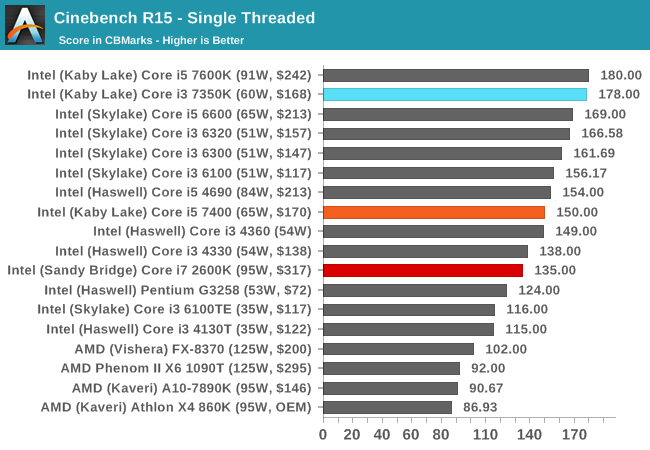
All the Kaby Lake processors seem to do well in CB15 single threaded performance, given that all the K-processors can reach 4.2 GHz or higher one way or another. Nonetheless, the age of the Core i7-2600K is showing here.
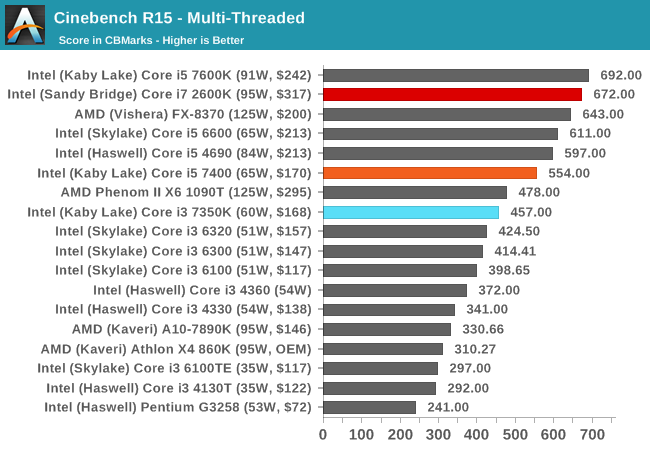
Turning the tables with actual cores, and the Core i7-2600K gets a significant leg up here. The Core i5 also sits above the Core i3.
HandBrake v0.9.9: link
For HandBrake, we take two videos (a 2h20 640x266 DVD rip and a 10min double UHD 3840x4320 animation short) and convert them to x264 format in an MP4 container. Results are given in terms of the frames per second processed, and HandBrake uses as many threads as possible.
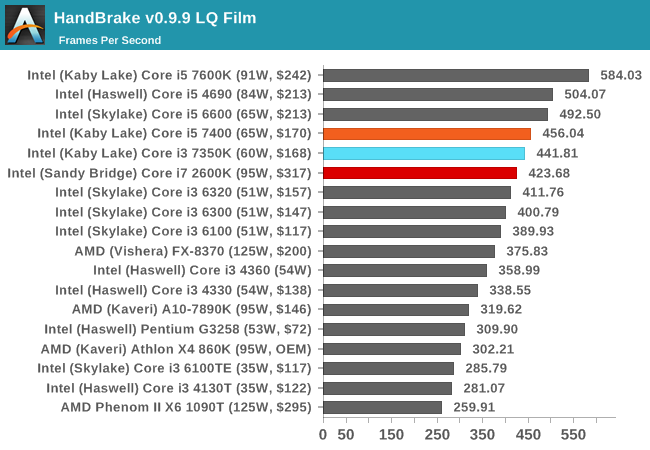
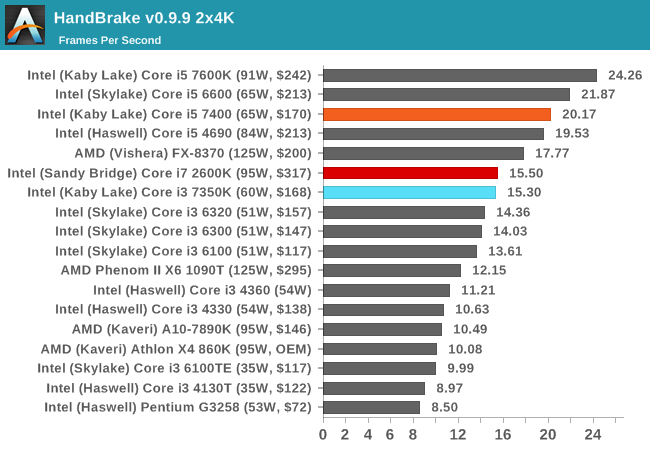
For video conversion, having small frames puts all three CPUs in a similar spot. But ramp up the frame size and we see the Kaby Lake i5 pull ahead due to IPC and instructions. The Core i3 has enough oomph to match the extra threads on the Core i7-2600K though.
Hybrid x265
Hybrid is a new benchmark, where we take a 4K 1500 frame video and convert it into an x265 format without audio. Results are given in frames per second.
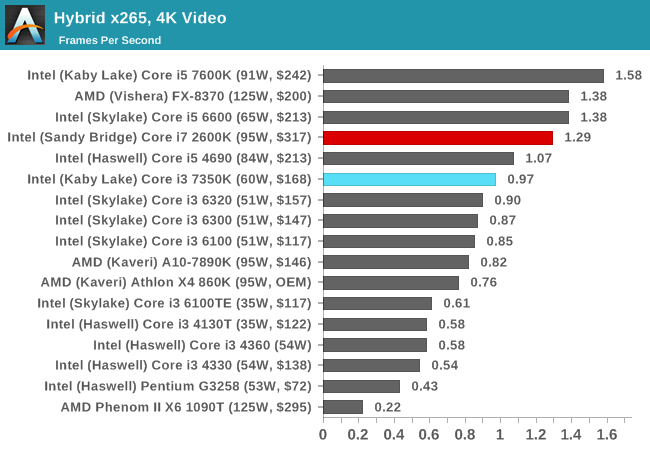
With a different video conversion tool and render, the extra cores and threads of the Core i7 is more than enough to give it a 30% advantage over the Core i3-7350K. It makes me wonder if another +30% frequency would help the Core i3.










186 Comments
View All Comments
CaedenV - Friday, February 3, 2017 - link
Seems to me you only hit the CPU wall when dealing with multiple GPUs. For most games, with a single GPU, and i3 is plenty. Considering an i3 does not have enough PCIe lanes to support multiple GPUs this is a rather moot point.Aerodrifting - Saturday, February 4, 2017 - link
Like I said, You don't play any CPU demanding games so you have no right to make those ridiculous comments. Take battlefield 1 for example, Good luck in a 64 player map with i3.Michael Bay - Saturday, February 4, 2017 - link
>plays bf1>blabs about rights
You`re like a perfect example.
Aerodrifting - Saturday, February 4, 2017 - link
Nice trolling, loser.I am simply making a point: There are tons of games can bottleneck i3, Battlefield 1 is just one example, Stop lying to others "i3 can game just fine like i7 etc" it's very misleading and misinformed.
fanofanand - Sunday, February 5, 2017 - link
Considering the length of time Dr Cutress has been reviewing CPUs and gaming, any notion that he is not fit to be reviewing gaming CPUs is absurd.Aerodrifting - Sunday, February 5, 2017 - link
The notion of someone who is good at theorycraft reviews must be an expert at knowing gaming PC is absurd. 1 min of benchmark run in single player mode suddenly makes you an expert at gaming computer? Give me a break.BrokenCrayons - Thursday, February 9, 2017 - link
If you doubt the validity of the claims made in these articles in spite of the years of experience the writers have AND the supporting evidence of their work, then its rather odd you'd read any of these reviews at all. We can infer from your responses that you feel insecure about your purchase decisions, feel compelled to defend them aggressively, and that you're dismissing the evidence at hand even though you personally find it useful so you can justify the defensiveness -- more to yourself than others here because honestly, why should the opinions ruffle your feathers if there's genuinely no doubt in your mind that you feel you're as correct as you claim?Aerodrifting - Saturday, February 11, 2017 - link
Nice job coming up with such rhetoric yet no concrete evidence in your argument. I do NOT DOUBT the validity of the claims, I KNOW they are WRONG for a fact. Your reviewers do reviews for the sake of results from incomplete tests and benchmarks that can not represent real life results, Therefore the conclusion is wrong. I have been playing video games and playing around with hardware when you guys were playing with sand, Before this website is even established, Yet you want to talk about "years of experience"? I am not defending anything, I am simply pointing out you are wrong and you are misleading people, You are just butthurt because finally someone is having a different opinion and they are actually right.You want evidence? Let's save the rhetoric and go straight to facts, There are games that can severely bottleneck i3 or even i5, Battlefield is just one of them. Doesn't matter what video card you use, Join a 64 player game and you can see your CPU usage go over 90% and game starts stuttering on i3 / i5.
Ratman6161 - Friday, February 3, 2017 - link
"there will be a time where a Core i3 based CPU will match the performance of the older Core i7-2600K"Maybe, but not today! I'm still patting myself on the back for my purchase of the i7-2600K back in the spring of 2011. My first computer ran an 8088 and for every computer I owned weather off the shelf or self built from then until 2011 left me constantly on the upgrade treadmill looking for more speed . But with the 2600K I finally hit good enough (other than adding more RAM and replacing spinning disks with SSD's along the way). While its fun to read about the new stuff I don't really see myself upgrading again until either the CPU or (more likely) the motherboard give out.
CaedenV - Friday, February 3, 2017 - link
Yep! I have upgraded the ram several times, the GPU a few times, and moved from HDD to SSD, all of which have kept my 2600 very happy.What is going to get me to change over is going to be the motherboard level improvements. I cant get a much faster GPU without hitting a PCIe2 bottleneck. NVMe, while impractical (real world tests show little to no improvement), has me drooling for an upgrade. 4-10gig Ethernet is going to be more and more popular going forward. DDR4 is finally maturing to a point where it is actually better than DDR3. All new devices run USB-C, and my piddly 4 USB3 ports can't do them all, and certainly not at full speed.
It is literally everything around the CPU that is slowly making me want to upgrade, not the CPU itself. But even these improvements need another year or two to bake before I am really thinking about an upgrade. I am just unfortunately very happy with what I have, and I have one more GPU upgrade (looking forward to something like a GTX1170) before I will really need a new system.
Who knows, this might be my last 'real' PC. In a few years it may make more sense to have a central gaming server that runs all the games, and then stream them to an end-user PC that is no more powerful than a cell phone.... or just dock my cell phone.